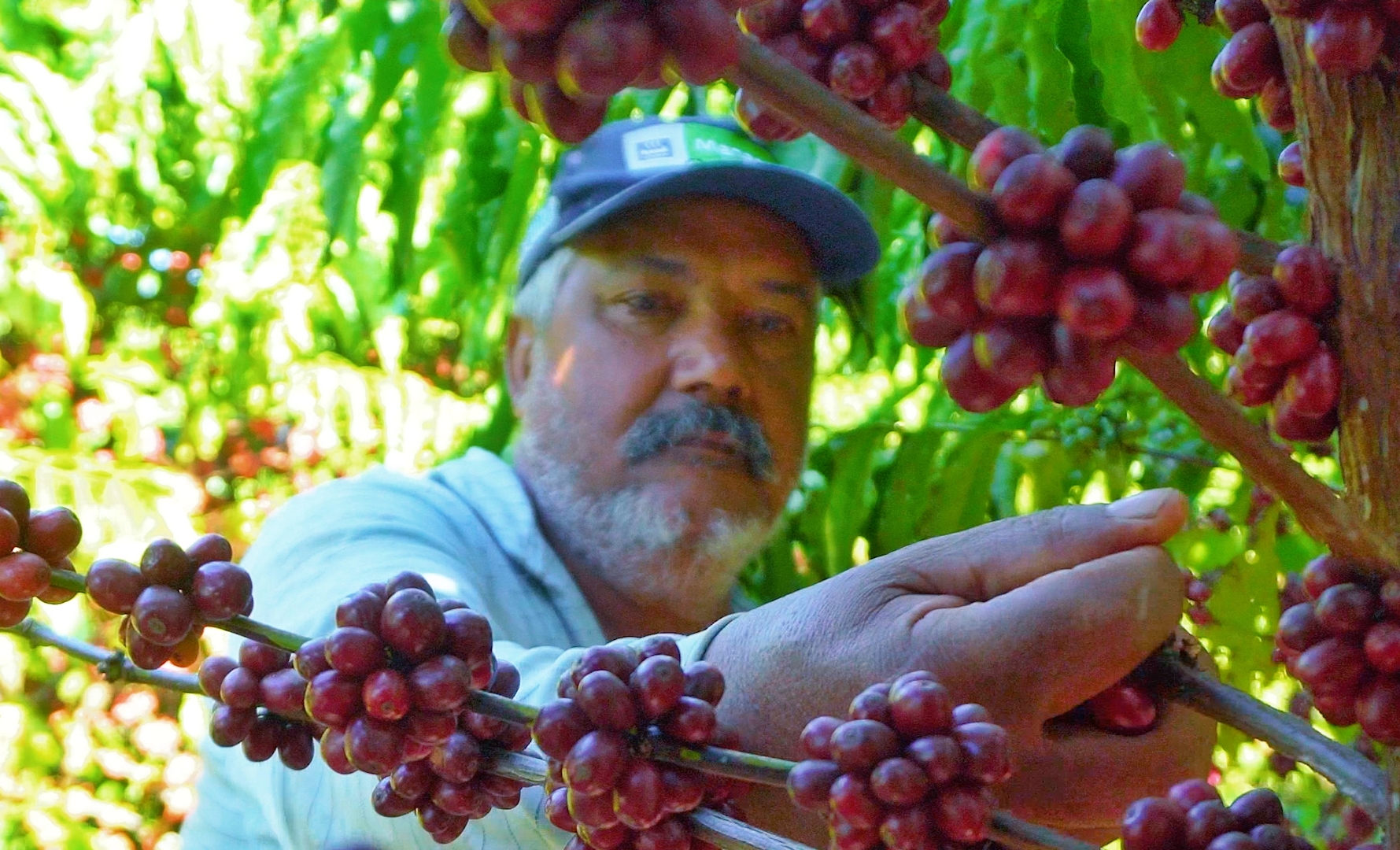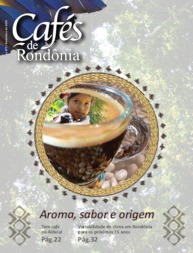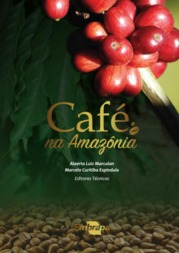Embrapa launches documentary on the production of fine Robusta coffee in Amazonian terroir
Embrapa launches documentary on the production of fine Robusta coffee in Amazonian terroir
The video portrays a true revolution in the field, based on tradition, technology and sustainability. .
The documentary “Amazonian Robustas - Aromas, flavors and stories that come from the Forests of Rondônia” portrays the reality of such unique, emblematic and sustainable coffee farming. It is a 50-minute immersion in this Amazonian terroir led by stories on life and cultural and agronomic values in this region. It features the production of a quality coffee that embodies pioneer traditions, indigenous culture, and the dreams of men, women and youth in the field.
Such coffees not only reflect their unique genetics, that have adapted to Amazonian lands; but are special beans that aggregate richness, technology and conservation. Their aromas and flavors bear the complexity and the mixture of the people who produced them. The full documentary is available on Embrapa's Youtube channel.
Documentary: Amazonian Robustas - Aromas, flavors and stories that come from the Forests of Rondônia
The whole plot takes place in the region that holds over 60% of the areas with coffee crops in Rondônia, responsible for 83% of the over 2 million coffee bags produced annually in the state. The region is known as Matas de Rondônia, or Forests of Rondônia, terroir of the Amazonian Robustas, which is at the final stages of obtaining a Geographical Indication (GI) seal. This will be the first GI of sustainable Canephora coffees (Robusta and Conilon) in the world, certified by the Global Coffee Plataform - GCP..
Geographical indication (GI): origin, story and know-how
A GI distinguishes a product or service that shows differentiated features that can be attributed to their geographical origin, as a reflex of their environment. This means that, on top of their natural conditions, human and cultural factors matter. The formal recognition of GIs in the country and geographic responsibility is one of the competences of the National Institute of Intellectual Property - INPI, a Brazilian government agency. In the field, the Geographical Indication of the Amazonian Robustas can strengthen and add value to what farmers have already been doing for years. With awards for the quality and sustainability of the coffees they produce, they already use the Amazonian Robust differential and designation to add more value to their product and hence obtain more income. One of the immediate results in the GI process is the identification, recognition and publicization of the attributes of the coffee from the region to society and the industry. The closer ties between the industry and the production chain and its organization brings countless benefits, such as the perception of quality and value for the coffee. This can generate new products that will be available for consumers. The process of Geographical Indication happens at a very appropriate moment, when consumers want to know from where the product that they consume comes, how it is being produced, if it is sustainable and if it adds value to the community.Rondônia is the fifth largest coffee producer of the country, the second one for Canephora species, and it is responsible for 97% of all the beans produced in the Amazon region. In recent years, farms in the state have been going through a continuous technological evolution, becoming more productive, sustainable and improving the quality of the beans. In nearly two decades, their yield evolved from 8 to 38 bags per hectare and the drink quality and sensory characteristics of the Amazonian Robustas has been winning competitions and earning new consumers. .
Rondônia is the fifth largest coffee producer of the country, the second one for Canephora species, and it is responsible for 97% of all the beans produced in the Amazon region. In recent years, farms in the state have been going through a continuous technological evolution, becoming more productive, sustainable and improving the quality of the beans. In nearly two decades, their yield evolved from 8 to 38 bags per hectare and the drink quality and sensory characteristics of the Amazonian Robustas has been winning competitions and earning new consumers.
Coffee cropping is one of the agricultural activities that generates the most Tax on Goods and Services - ICMS for the state of Rondônia. According to data from the Brazilian Institute of Geography and Statistics (IBGE), the crop is planted by about 17,000 agricultural enterprises. They are production modules with an average of four hectares each with the crop. Labor is family-based and the harvesting process is manual. The exception is for a small group of farmers who have equipment for semi-mechanized harvests.
Coffee identity that promotes social change in the Amazon
Studies performed by Embrapa and partners have already demonstrated that the state of Rondônia, due to climate, soil and genetic selection, produces robusta or “robusta-ed” coffees - crossings of coffees from the Canephora species, the botanical varieties robusta and conilon. In such natural hybrids, the agronomic and sensory traits of the robusta botanical variety prevail.
Since the state is main one responsible for the coffee produced in the Amazon, it did not take long until the 'Robusta' and 'Amazon' became part of the same name and started to represent the beans produced in Rondônia and the entire Amazon region.
On top of being technically appropriate, this identity embodies information and adds value. It is the recognition of a coffee that has unique characteristics in a region that does not have paralels in the world. “Embrapa was audacious when it proposed a new identity for Amazonian coffees to the national coffee sector. The market acceptance of the results so far obtained demonstrate that this was the right choice”, comments Enrique Alves, a researcher from Embrapa Rondônia.
In addition to the unique genetics of the coffee plantations that were selected in Amazonian soils in the course of four decades, it represents the mixture of a people who came searching for better lives in the Amazonian Eldorado. Today, these coffee farmers, who emigratd from the states of Minas Gerais, Espírito Santo and Paraná, joined the indigenous peoples to produce fine beans and with very special sensory characteristics. It has the aromas and flavors of the forests with hints of nuts, chocolate and exotic fruits.
The documentary portrays the history of struggles and achievements of these pioneers, and their relationship with the land, with nature and with the coffee. It narrates the saga of those who took ownership of the knowledge and of the technology, multiplied it and are helping to promote the evolution of coffee farming from the field to the cup and the transformation of the whole sector.
For the researcher Enrique Alves, the technological knowledge developed by research only makes sense if it is appropriated in the fields as a tool for positive change, income generation, improved quality of life and social inclusion. “I believe in the transformative power that the use of sustainable production technologies can have in the reality of family farming and of traditional Amazonian communities”, Alves asserts.
The recognition that state's coffee farming has achieved in recent years is a reflection of the combined efforts of farmers, research institutions, rural extension and governmental bodies.
Adoption of technologies and value aggregation
With the use of technologies there is a new range of possibilities in the quality production of Canephora coffees. Embrapa Rondônia has been working to motivate and inform best practices in the field. In thepost-harvest, their biggest advances are obtaining the ideal point of harvest, the validation of equipment for semi-mechanized harvest, and the processes of slow and careful drying of the fruits to reach the desired quality.
With the evolution of the genetic materials and launch of individual clones, the researchers recommend that, despite being planted in successive rows - six or more clones -, each clone should receive individual (plant) and collective (cropland) attention at the time for crop treatments, fertilization, pruning, and especially, during the harvest and post-harvest. Research has demonstrated that each clone has distinct genetic characteristics with consequences to their maturation cycles, which gives them particular sensory traits.
Different types of sun dryers were also validated and recommended to sustainably improve fruit quality at ideal temperatures (35°C to 45°C). Those methods are suitable for the production of microlots or in small areas, as it happens in Rondônia. More elaborate fruit processing techniques are constantly being developed and validated at Embrapa's experimental fields or in farmers' lands.
The processes of controlled or positive fermentations, which were also validated by Embrapa, have increasingly been adopted by coffee growers. As a result, many coffees have been awarded in competitions and are already part of a process of change in the sensory profile of the Amazonian Robustas, becoming more exotic and distinguished. “The effects of the action of microorganisms on the berries and beans intensify the characteristics of acidity and sweetness, making the beverage more balanced and interesting for more demanding palates”, explains Enrique Alves.
Positive fermentation of coffee Pruning for semi-mechanized harvest
The owners of the story: quality, inclusion and recognition
The documentary features six coffee farmer families who represent the cultural diversity and wealth present in the production of specialty Amazonian Robustas in the Matas de Rondônia forest region. These families rescue their history and carry the legacy of the visionary pioneers who came to the Amazon in the pursuit of a dream. That is the origin of a coffee farming that resulted from the combination of Conilon from Espirito Santo state and the Robustas provided by Embrapa, in partnership with the Campinas Agronomic Institute - IAC.
The farmers, Embrapa Rondônia's partners, use technologies that were generated, validated and recommended by scientific research. “There is still a lot to do, but it is already possible to see that the Amazon is in the right path, as coffee cropping is increasingly more concerned with becoming sustainable, inclusive, efficient and with quality”, concludes the researcher.
Renata Silva (MTb 12361/MG)
Embrapa Rondônia
Press inquiries
rondonia.imprensa@embrapa.br
Phone number: +55 69 3219-5011
Mariana Medeiros (Translation - English)
General Secretariat
Further information on the topic
Citizen Attention Service (SAC)
www.embrapa.br/contact-us/sac/



